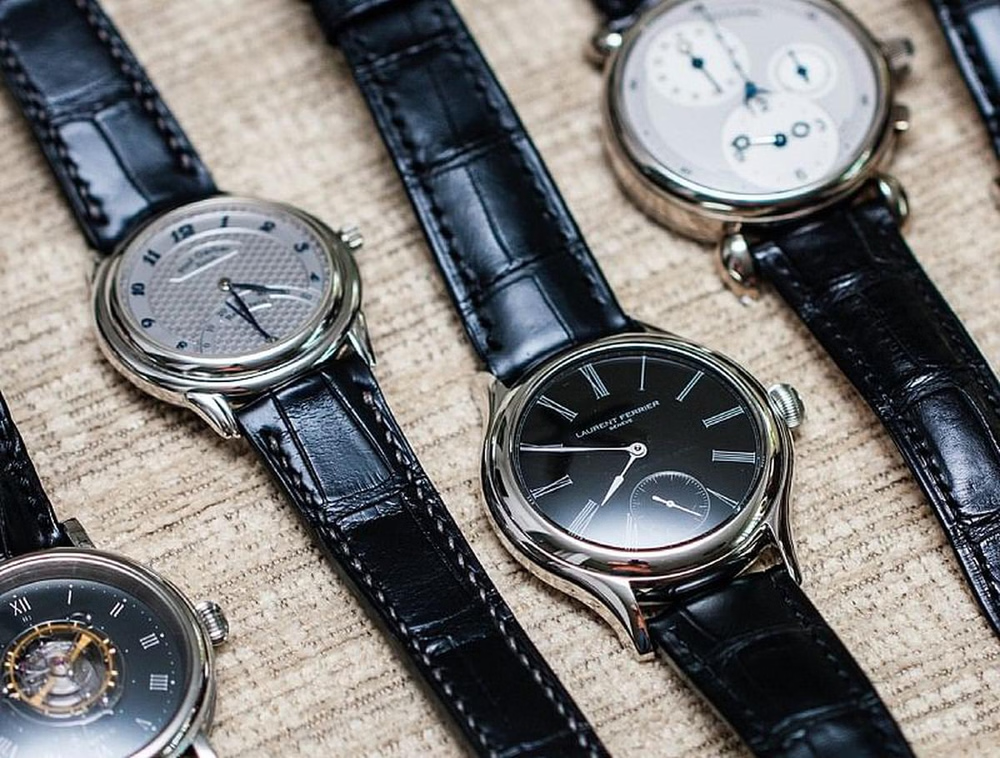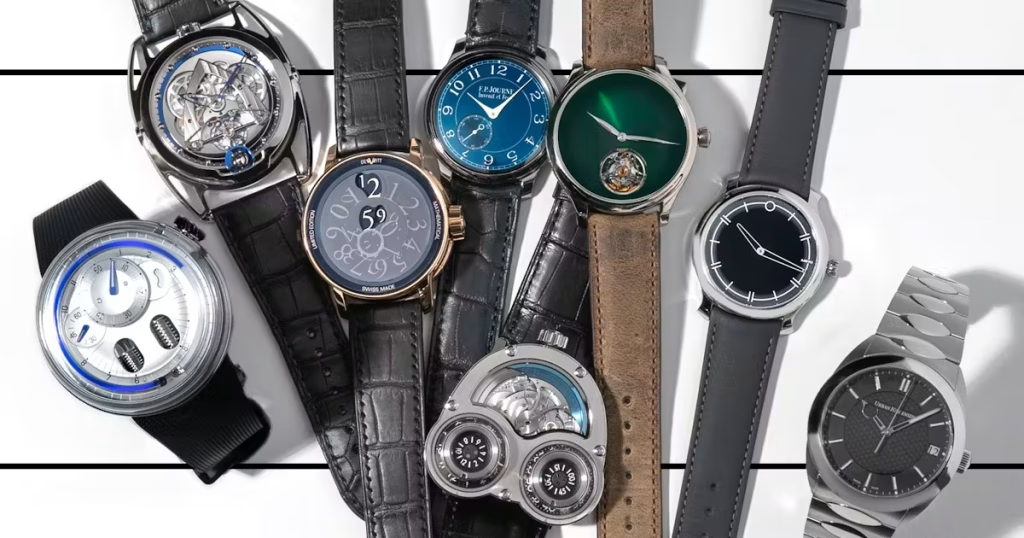Blog
The Rise of Independent Watchmakers: Craftsmanship at Its Best
In recent years, the world of horology has witnessed a remarkable shift toward the rise of independent watchmakers. As the luxury watch industry continues to evolve, these small, often family-owned brands are gaining significant recognition for their exceptional craftsmanship, creativity, and innovation. Independent watchmakers have become a symbol of a return to traditional watchmaking, where artisans focus on quality over mass production and personal passion over corporate interests.
In this article, we will explore the rise of independent watchmakers, the qualities that set them apart, and the future of this fascinating movement in watchmaking.
1. What Makes Independent Watchmakers Stand Out?
Independent watchmakers, often working out of small workshops or private studios, distinguish themselves from large, corporate-owned watch brands through their commitment to craftsmanship, attention to detail, and innovation. While large watch manufacturers may produce timepieces in mass quantities, independent watchmakers focus on creating unique, high-quality pieces, often with custom designs and specialized features.
Personalized Designs
One of the most significant aspects of independent watchmaking is the ability to craft personalized and limited-edition timepieces. Unlike mainstream luxury watch brands, independent watchmakers typically have the freedom to design watches that reflect their individual tastes and philosophies. Whether it’s a one-of-a-kind custom design or a limited run of just a few pieces, these watches offer a level of exclusivity that mass-produced models simply cannot match.
Attention to Detail and Quality
Independent watchmakers take pride in every aspect of their work, from designing the movement to hand-finishing the components. While large brands may outsource various aspects of production, independent watchmakers often handle the entire process themselves or with a small team of skilled artisans. This allows for an unparalleled level of craftsmanship, resulting in watches that stand the test of time both in terms of functionality and aesthetics.
Innovation and Experimentation
Many independent watchmakers are known for their willingness to experiment with unconventional designs and materials. Whether it’s incorporating new materials like titanium or carbon fiber into the watch case, or developing unique movements that push the boundaries of traditional watchmaking, independent watchmakers are at the forefront of horological innovation. These pioneers are not afraid to break the mold and offer new concepts that challenge the status quo.

2. The History and Evolution of Independent Watchmaking
The tradition of independent watchmaking dates back centuries, but it was in the late 20th century that this niche segment of the industry began to rise in prominence once again. During the 1980s and 1990s, the Swiss watch industry was undergoing significant changes due to the Quartz Crisis, which saw the widespread use of quartz technology in watches. During this time, many of the traditional Swiss watchmakers faced challenges, and some even ceased operations as quartz watches dominated the market.
However, as the demand for mechanical watches continued to grow, independent watchmakers began to emerge as a counterpoint to the mass-produced quartz watches flooding the market. These artisans focused on preserving traditional watchmaking skills while incorporating modern advancements into their creations. As consumers increasingly sought authenticity and craftsmanship, independent watchmakers found a receptive audience, and their success began to rise.
Today, independent watchmaking is thriving, with artisans around the world producing highly sought-after pieces that appeal to collectors and horology enthusiasts. Brands like F.P. Journe, A. Lange & Söhne, and Richard Mille have brought independent watchmaking into the mainstream, creating some of the most coveted and expensive watches in the world.
3. Notable Independent Watchmakers Making Waves
Several independent watchmakers have gained global recognition for their exceptional contributions to the world of horology. These artisans have not only elevated the craft but also set new standards for what is possible in watchmaking. Here are a few notable names that exemplify the rise of independent watchmakers:
F.P. Journe
François-Paul Journe is one of the most well-known names in independent watchmaking. Founded in 1999, F.P. Journe has become synonymous with innovation and artistic excellence. Known for creating some of the most complicated and precise movements in the industry, Journe’s timepieces blend traditional Swiss craftsmanship with contemporary design elements. Each piece is produced in limited numbers, adding to its exclusivity.
Richard Mille
Richard Mille is another powerhouse in the world of independent watchmaking. Known for pushing the boundaries of design and technology, Mille’s timepieces are instantly recognizable for their bold, modern aesthetic and use of cutting-edge materials like titanium and sapphire. Richard Mille has successfully merged watchmaking with art and sports, making his timepieces a favorite among collectors and athletes alike.
A. Lange & Söhne
Though technically considered a luxury watch brand, A. Lange & Söhne operates with an independent mindset. The German brand, founded in 1845, is renowned for its commitment to traditional craftsmanship and mechanical precision. With intricate movements and elegant designs, A. Lange & Söhne has established itself as a key player in the world of independent watchmaking.
MB&F (Maximilian Büsser & Friends)
MB&F, founded by Maximilian Büsser, is known for its avant-garde designs and creative approach to watchmaking. The brand regularly collaborates with talented independent artisans to create visually stunning and technically complex timepieces. MB&F’s unique approach challenges traditional horology, leading to watches that are as much a work of art as they are a timekeeping device.

4. The Appeal of Independent Watches for Collectors
The rise of independent watchmakers has captured the attention of collectors worldwide. Several factors contribute to the growing appeal of these artisanal timepieces:
Exclusivity and Rarity
Many independent watchmakers produce limited quantities of each model, making their watches highly exclusive. The rarity of these timepieces is a major factor in their appeal, as collectors value the opportunity to own something truly unique. Limited production runs also allow independent watchmakers to focus on quality rather than quantity, ensuring each piece is carefully crafted.
Heritage and Craftsmanship
Independent watchmakers are often deeply committed to preserving the heritage of traditional watchmaking techniques. Many of them use hand-finishing, hand-engraving, and other meticulous processes to create their watches, ensuring that each piece is a masterpiece in its own right. This craftsmanship resonates with collectors who appreciate the artistry and skill that go into every watch.
Personal Connection
When buying from an independent watchmaker, collectors often feel a personal connection to the artisan behind the creation. Many independent watchmakers are known for their direct interactions with customers, offering bespoke designs and personalized services. This level of involvement creates a bond between the watchmaker and the owner, enhancing the ownership experience.
5. Challenges Facing Independent Watchmakers
While the rise of independent watchmaking is exciting, these watchmakers face several challenges in the highly competitive world of horology:
Production Costs
The labor-intensive nature of creating a high-quality timepiece means that production costs for independent watchmakers are significantly higher than for mass-market brands. This makes it difficult to produce watches at a price point accessible to a wider audience. As a result, many independent watchmakers focus on creating high-end luxury pieces that cater to a niche market of collectors and enthusiasts.
Scaling Production
Many independent watchmakers prefer to keep their operations small to maintain the level of craftsmanship they are known for. However, this can limit their ability to scale production and meet growing demand. As a result, some watchmakers find it challenging to balance exclusivity with business growth.
Brand Recognition
Independent watchmakers often lack the marketing budgets and brand recognition that large watch companies enjoy. This makes it difficult for new or smaller independent brands to gain widespread visibility. However, as the popularity of independent watches grows, more consumers are becoming aware of these unique timepieces, and demand is beginning to rise.
6. The Future of Independent Watchmaking
The future of independent watchmaking looks bright. As consumers continue to seek authenticity, craftsmanship, and exclusivity in their timepieces, independent watchmakers are poised to thrive. Advances in materials science, design, and technology will only further enhance the creative possibilities for independent artisans, allowing them to push the boundaries of traditional watchmaking even further.
With a growing appreciation for unique, high-quality pieces, the rise of independent watchmakers is not just a trend but a movement that is shaping the future of horology.
Conclusion
The rise of independent watchmakers is a testament to the enduring value of craftsmanship, artistry, and innovation in watchmaking. These artisans are proving that there is more to horology than mass production and corporate-driven designs. By focusing on quality, creativity, and exclusivity, independent watchmakers are redefining what it means to own a luxury timepiece. As the demand for these exceptional watches continues to grow, the future of independent watchmaking has never looked brighter.

